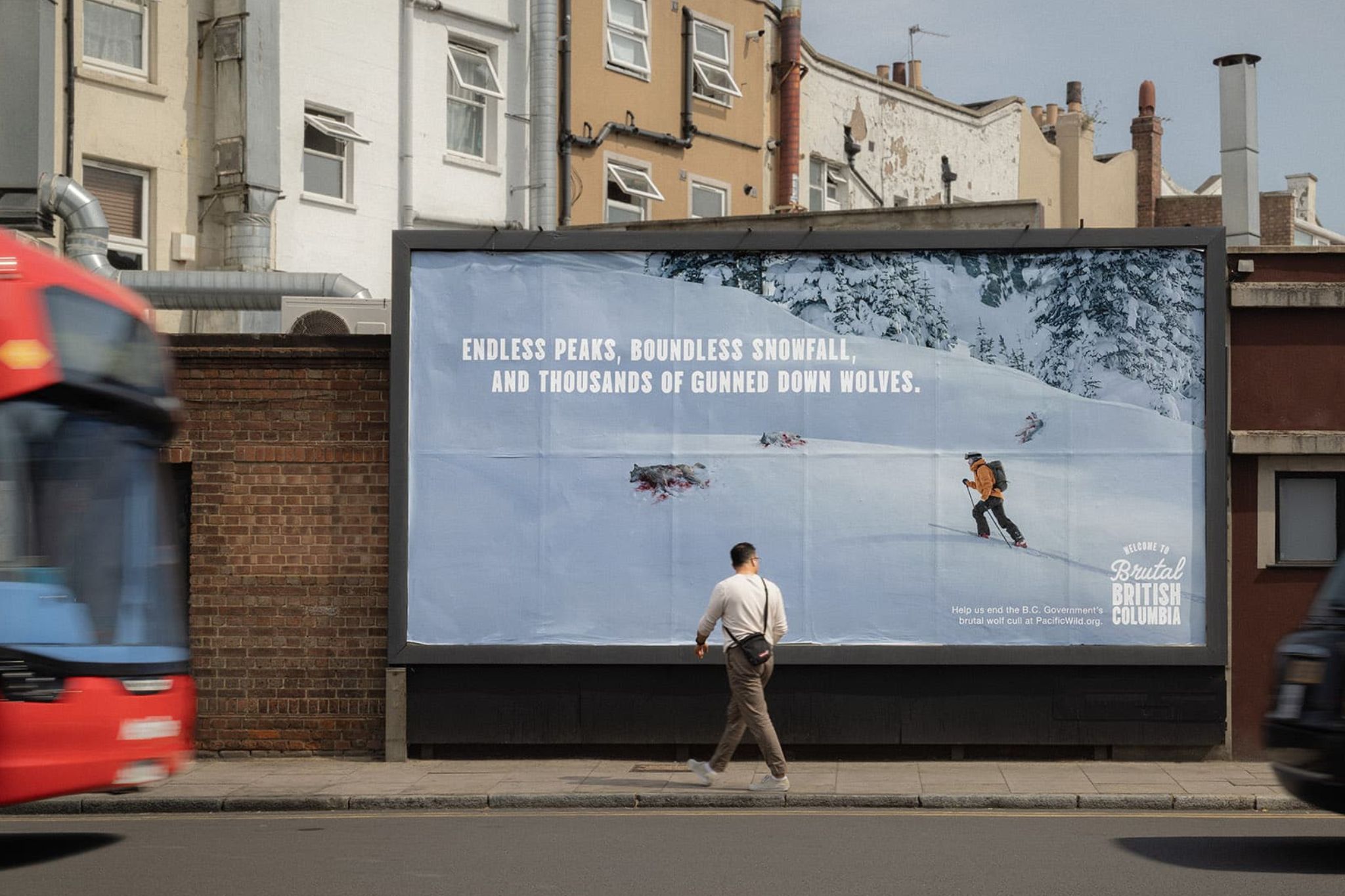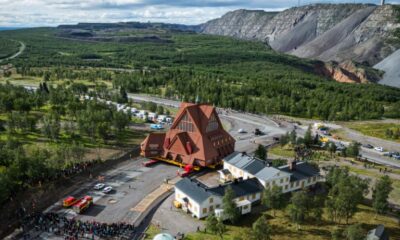Lifestyle
Victoria’s Pop-Up Shop Shines Light on B.C.’s Wolf Cull

Tourists in downtown Victoria were confronted with a stark reality earlier this month as a temporary souvenir shop showcased the controversial wolf cull in British Columbia. Instead of typical items like maple-leaf mugs, visitors encountered bloodstained tote bags and lifeless plush wolves. This pop-up was part of Pacific Wild’s “Brutal British Columbia” campaign, which launched on August 1, 2023, in collaboration with the Vancouver agency ONE23WEST. The initiative aims to challenge the province’s polished tourism image by highlighting what advocates describe as a “brutal secret” behind the scenes.
“Our goal was to flip the province’s glossy tourism brand on its head,” said Natasha Wehn, project director at Pacific Wild, in a press release. She emphasized that while many come to British Columbia for its stunning wilderness and wildlife, the reality reflects a different narrative.
The campaign has garnered international attention, particularly on International Wolf Day on August 13, 2023. Pacific Wild unveiled billboards in cities such as London and Berlin, contrasting picturesque B.C. landscapes with stark images of wolves shot from helicopters. Additionally, they premiered a short film on the lawn of the B.C. Legislature, capturing the shocked reactions of visitors who encountered the pop-up shop.
“We’re not asking anyone to turn away from B.C. — we’re asking them to speak up for it, because what’s at stake is too important to ignore,” Wehn stated in the campaign’s launch video on YouTube. She highlighted that over the past decade, Pacific Wild has delivered more than 500,000 signatures to the Legislature, calling for an end to the wolf cull, which has seen more than 2,100 wolves killed since its inception in 2015.
The Wolf Cull’s Impact
The province’s predator reduction program has cost taxpayers over $10 million, according to information from the Pacific Wild website. Conservation advisor Ian McAllister has described this initiative as “a war on wolves throughout most of British Columbia.” He noted, “Over this 10-year period, over 2,500 wolves have now been killed, mostly by helicopter, at the cost of over $11 million taxpayer dollars.”
Originally intended to protect endangered caribou herds, the wolf cull has drawn heavy criticism for its approach. Advocates argue that it fails to address the primary threats facing caribou, such as habitat loss due to logging, mining, and recreational activities. McAllister stated, “Blaming wolves is both unscientific and unethical. We fundamentally disagree that killing wolves is going to save caribou.”
In fact, a 2020 study has shown that over 900 square kilometers of critical caribou habitat were logged since 2014, despite the ongoing cull. The methods used in the cull have also raised animal welfare concerns, with wolves often pursued until exhausted and left wounded. “They certainly are not a risk to humans,” McAllister remarked. “The government fundamentally doesn’t understand the important role wolves play in ecosystem management.”
The program has even resorted to using “Judas wolves,” collared animals that are spared to lead hunters back to their packs. McAllister and Pacific Wild are now urging the B.C. government to conduct an independent audit of the wolf cull, asserting that independent biologists would recommend its immediate termination due to its lack of scientific support.
Growing Support for Change
The “Brutal B.C.” campaign has received support from various stakeholders, including Indigenous leaders and eco-tourism operators. The Union of B.C. Indian Chiefs has described wolves as “relatives, revered as sacred,” emphasizing their integral role in Indigenous cultures and ecosystems.
Colin Griffinson, owner of Pacific Yellowfin Charter, echoed these sentiments, stating, “After decades of guiding visitors along this coast, I’ve seen firsthand how essential wolves and other wildlife are to the magic of this place. This cull isn’t just a tragedy for the animals — it’s a threat to the identity and economy of our province.”
Tourism in British Columbia generated $22 billion in 2023 and supported over 125,000 jobs. Campaigners argue that the ongoing wolf cull not only jeopardizes local wildlife but also risks damaging the province’s global reputation as a pristine wilderness destination.
Pacific Wild encourages individuals interested in supporting their cause to visit their website for resources or to contact Premier David Eby’s office directly at 250-387-1715. The organization’s mission is clear: to end the wolf cull and protect the natural heritage that defines British Columbia.
-

 Science6 months ago
Science6 months agoToyoake City Proposes Daily Two-Hour Smartphone Use Limit
-

 Top Stories6 months ago
Top Stories6 months agoPedestrian Fatally Injured in Esquimalt Collision on August 14
-

 Technology6 months ago
Technology6 months agoDark Adventure Game “Bye Sweet Carole” Set for October Release
-

 Health6 months ago
Health6 months agoB.C. Review Reveals Urgent Need for Rare-Disease Drug Reforms
-

 World6 months ago
World6 months agoJimmy Lai’s Defense Challenges Charges Under National Security Law
-

 Technology6 months ago
Technology6 months agoKonami Revives Iconic Metal Gear Solid Delta Ahead of Release
-

 Technology6 months ago
Technology6 months agoSnapmaker U1 Color 3D Printer Redefines Speed and Sustainability
-

 Technology6 months ago
Technology6 months agoApple Expands Self-Service Repair Program to Canada
-

 Technology6 months ago
Technology6 months agoAION Folding Knife: Redefining EDC Design with Premium Materials
-

 Technology6 months ago
Technology6 months agoSolve Today’s Wordle Challenge: Hints and Answer for August 19
-

 Business6 months ago
Business6 months agoGordon Murray Automotive Unveils S1 LM and Le Mans GTR at Monterey
-

 World6 months ago
World6 months agoHistoric Kiruna Church Moves to New Location Amid Mine Expansion










